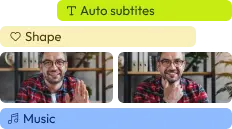Flixier Podcast Transcript Generator
Your Tool of Choice for Podcast Transcription


Try the Podcast Transcriber
Navigating the podcast world? It shouldn't be a chore to transcribe a podcast episode. With Flixier's podcast transcriber, you can swiftly turn spoken content into a comprehensive transcript. Whether you're looking to transcribe a podcast for accessibility, SEO, or repurposing, we've got you covered. And for those branching out into video, our podcast video editor makes the transition seamless. Need to extract audio from videos? Our online video editor handles it with ease. Embrace the full spectrum of podcast transcription and editing, all under one roof.
Boost Accessibility
When you provide a transcript of the podcast, you ensure that your content reaches those with hearing impairments. Transcribing a podcast not only widens your audience base but also demonstrates inclusivity and thoughtfulness in content presentation. It's about connecting with everyone, without barriers.
Enhance SEO Rankings
Search engines love text. With a comprehensive podcast transcription, you give search engines more content to index, helping your podcast rank higher and become more discoverable. Stay ahead in the digital realm with optimized content.
Repurpose with Ease
A transcript podcast can easily be turned into blog posts, social media snippets, or eBooks. This amplifies your content's reach and provides diverse ways for audiences to engage. Multiply the impact of each episode with our podcast transcriber.
Simplify Editing
With Flixier's podcast video editor, aligning visual content with your transcript podcast text becomes a breeze. This ensures your video podcasts are both captivating and informative. Marry sound and sight flawlessly with the fast and accurate podcast transcriber.
How to Transcribe a Podcast?
To start using Flixier’s podcast transcriber, click either the 'Transcribe' or 'Get Started' buttons displayed above. If you already have an audio or video file ready, drag and drop it into the designated upload area. Alternatively, you can use the 'click to upload' function.
Once your content is uploaded, activate the podcast transcript generator by pressing the 'Generate' button. In the next few minutes, you’ll see the transcript podcast text conveniently appearing on your screen. Feel free to modify the text to your liking before downloading.
Eager to secure your podcast transcription? Simply navigate to the 'Download' button located at the screen's bottom left. From there, you can export your transcript in multiple formats (TXT, SRT, SUB, VTT, WebVTT, and more), ensuring your transcript podcast content is just what you need.

Why Use Flixier as a Podcast Transcript Generator?

Offer Flexible Consumption
Some prefer reading over listening. Offering podcast transcription caters to that preference, ensuring every potential listener or reader stays engaged with your content. Adapt to your audience's lifestyle.

Utilize Advanced Tools
The era of manual transcription is behind us. With tools like the podcast transcript generator, the process is efficient, saving time and reducing potential errors. Modern solutions for modern creators.

Transition to Video Seamlessly
Looking to go from text to video? Our online video editor has got you covered. It's easy to use the podcast transcriber to turn your transcript into video content. You'll get the same great quality in both formats. Simple and user-friendly, it's a smooth switch!

Streamline Collaborations
Sharing a transcript podcast text with collaborators or sponsors is easier than sharing only audio. It allows for quick feedback, ensures clarity, and aids in seamless content production and partnerships. Foster clear, constructive dialogues as you transcribe a podcast collaboratively.
Need more than creating podcast transcripts automatically?

Edit easily
With Flixier you can trim videos or add text, music, motion graphics, images and so much more.

Publish in minutes
Flixier is powered by the cloud so you can edit and publish your videos at blazing speed on any device.

Collaborate in real-time
Easily collaborate on your projects with Flixier, we offer real-time feedback and sharing of projects.
You`re ingood hands
Over 1 million creators use Flixier every month including brands like:












Frequently
Asked
Questions
What can you do with podcast transcripts?
Podcast transcripts enhance content accessibility, catering to the hearing-impaired. By merging transcripts with visuals using a podcast video editor, content creators can reach a broader audience. Furthermore, transcripts boost SEO, making content more discoverable. Transcripts provide versatility, enabling content repurposing across multiple platforms.
What are the benefits of podcast transcripts?
Turning a podcast into text using a podcast transcriber has many upsides. For one, it opens doors for folks with hearing challenges to access the content. Plus, it's a boon for SEO—having text means search engines can better find and showcase your podcast. Some people just prefer reading to listening, so it's a win for them too.
And if creators combine these transcripts with an online video editor, they can also make use of visuals, making the content even more engaging. At its core, providing a transcript broadens your audience and offers more ways to share and enjoy your content.
How do you write a podcast transcript?
There are three main ways to transcribe a podcast: manually typing it out, using automated tools, or outsourcing to professionals. Manual methods ensure accuracy but take time. Automated tools are faster, while outsourcing relies on expert skills. Choose based on your speed, cost, and accuracy preferences.

